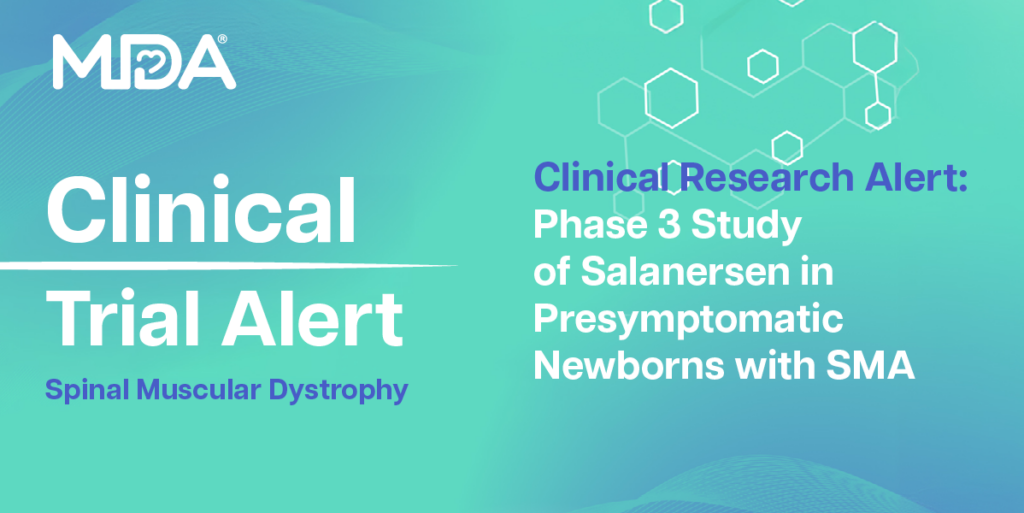
Your Guide to Genetic Testing for Neuromuscular Diseases
By Megan Kramer-Salvitti | Friday, June 20, 2025
5 Second Summary
Genetic testing is a key tool in diagnosing neuromuscular diseases and getting access to the best treatments and care. Here’s what you need to know — from how much it costs to how it works.
Genetic testing is an important part of diagnosing and managing neuromuscular diseases, including muscular dystrophies, spinal muscular atrophy (SMA), amyotrophic lateral sclerosis (ALS), and Pompe disease.

Genetic counselor Jennifer Roggenbuck
“Since many neuromuscular diseases have a genetic basis, genetic testing may be the quickest and least invasive way to get a diagnosis,” says Jennifer Roggenbuck, MS, CGC, a licensed genetic counselor and professor of neurology at The Ohio State University Medical Center. Genetic testing can provide an accurate genetic diagnosis and prevent misdiagnosis.
Unfortunately, many people with neuromuscular diseases have not had genetic testing done. Lack of access and high cost are common barriers. Fortunately, thanks to increasing insurance coverage and sponsored testing programs, genetic testing has become more accessible and affordable.
Benefits of genetic testing
The main benefit of genetic testing is getting an accurate diagnosis. Neuromuscular diseases can be clinically complex and often share symptoms. While traditional diagnostic tests for neuromuscular diseases, like creatine kinase (CK) tests and muscle biopsies, can give doctors useful information, they do not pinpoint the exact cause of a disease.
Genetic testing can offer a more definitive diagnosis by identifying mutations or variants in specific genes known to cause neuromuscular diseases. This is especially critical given the long diagnostic journeys many people in the neuromuscular community have had to endure.
For example, researchers have found that Pompe disease is “underrecognized and can be misdiagnosed as a variety of other conditions, including muscular dystrophy, inflammatory myositis, or even hepatic disease.” According to Pompe Disease News, diagnostic delays are common for both the infantile-onset and late-onset forms of the disease. Genetic testing for a GAA gene mutation is important for this community and their families, particularly because Pompe is an inherited disease.
Genetic testing can also help refine a diagnosis. “For example, in the case of a general diagnosis of limb-girdle muscular dystrophy, we can establish exactly what subtype by identifying the specific genetic variant responsible for the condition,” Jennifer says.
Increasing access to new therapies
Having exact information about the cause or subtype of a disease can help doctors provide a more accurate outlook, plan the best treatment course, and bring in supportive treatment, such as cardiology or surgery, when appropriate.
Testing can also open the door to treatments like gene therapy. Many new treatments may only be effective or approved for individuals with specific genetic diagnoses, so genetic testing can increase access to these options.
Increasing access to clinical trials

Genetic counselor Elicia Estrella
Many studies now require a confirmed genetic diagnosis for enrollment, especially those exploring gene-targeted therapies.
Access to clinical trials has the potential to benefit the person living with a neuromuscular disease and contribute to a broader understanding of the disease, potentially leading to new treatments and improved care.
“Medicines and clinical trials for neuromuscular diseases have exploded in the last three to five years,” says Elicia Estrella, MS, CGC, a licensed genetic counselor at Boston Children’s Hospital. “Without genetic testing, you may be closing the door to these opportunities.”
Cost of genetic testing
The out-of-pocket cost of genetic testing can range from under $100 to more than $2,000, depending on the type and complexity of the test. Health insurance plans may cover the costs of genetic testing when an individual’s doctor recommends it. Insurance providers have different policies about which tests are covered, so it’s important to contact your insurance provider to ask about coverage before testing.
Another avenue for low- to no-cost genetic testing is sponsored genetic testing programs. As the name implies, these programs are sponsored by third parties, so testing is free to the patient, healthcare facility, and provider who orders it. As part of the program, data that does not include personally identifiable information may be shared with the sponsors, which are typically pharmaceutical companies that develop treatments for neuromuscular diseases. Access to this data allows the companies to track disease trends and determine types of patients who may be candidates for their clinical trials or treatments.
To find out your options for genetic testing, talk with your neuromuscular specialist or genetic counselor.
Frequently asked questions about genetic testing
Common questions Jennifer and Elicia hear about genetic testing include:
What can I learn from genetic testing?
Through genetic testing, medical professionals can examine your genes for changes (called mutations or variants) that may cause a neuromuscular disease.
Genetic testing may be used to look for a genetic diagnosis in people with clinical signs or symptoms of a neuromuscular disease. Individuals with a family history of a genetic disease who do not have symptoms may choose genetic testing to learn if they carry a disease-causing gene.
“If you have a known diagnosis in your family and you’re going to get carrier testing, you will likely get a ‘yes’ or ‘no’ answer, and it will be very black and white,” Elicia explains. “But if you are the first person in your family to seek a diagnosis, there is a chance the results could come back less certain. For example, about 20% to 30% of results come back as a variant of unknown significance.” This means there is a gene variant detected, but there is no clear evidence that it causes a disease.
In these cases, individuals can have their tests re-examined over time. Researchers are uncovering new genes and data almost every day. “More data means more confirmed diagnoses,” Elicia says.
How does genetic testing work?
It depends on the test. Genetic tests may be done using blood, saliva, or buccal swabs (swabs of cells inside your mouth and cheeks). Some tests allow a person to collect their saliva or a cheek swab at home and send in their specimen by mail.
Are there drawbacks to genetic testing?
While genetic information is protected from health and employment discrimination under the Genetic Information Nondiscrimination Act (GINA), a confirmed diagnosis could affect your life insurance options.
Genetic testing also has limitations and may not be able to predict the severity of symptoms or how quickly a disease will progress.
You should be aware that genetic testing could have emotional effects. Waiting for results or receiving a positive diagnosis can be stressful and scary. Results can also lead to feelings of guilt in families with genetic conditions.
How can genetic testing help families and parents?
“While a genetic diagnosis is the starting point for understanding and managing a condition, it has benefits for family members, too,” Jennifer says. When there is a family history of an inherited disease, genetic testing can help family members understand their risks, prepare for them, and take action if they choose to.
Carrier screening has gained importance as part of family planning, as it helps identify genetic conditions that can be passed on to children. A carrier is someone who has a gene associated with a condition but is not affected by the condition themselves. Carrier testing done before pregnancy can help prospective parents decide if they’d like to explore alternative reproductive options, such as preimplantation genetic testing (PGT) with in vitro fertilization (IVF) or using donor eggs or sperm.
What is genetic counseling?
Genetic counseling can give you information about how a neuromuscular disease may affect you or your family. Elicia and Jennifer encourage anyone considering genetic testing to see a genetic counselor for support. A genetic counselor can address the pros and cons of genetic testing, inform you of any risks and possible results, walk you through results when you receive them, and help you decide how to communicate the results to your loved ones.
“I try to focus on the whole family,” Elicia says, “and I’m always here for questions.”
Next Steps and Useful Resources
- Download MDA’s disease-specific guides to genetic testing options, including no-cost and low-cost genetic testing. Find them on the Print-Ready Educational Materials page under “Genetics and Genetic Testing.”
- The MDA Resource Center can provide more information about genetic testing. Call 833-ASK-MDA1 or email ResourceCenter@mdausa.org.
- Stay up to date on Quest content! Subscribe to Quest Magazine and Newsletter.
Disclaimer: No content on this site should ever be used as a substitute for direct medical advice from your doctor or other qualified clinician.




